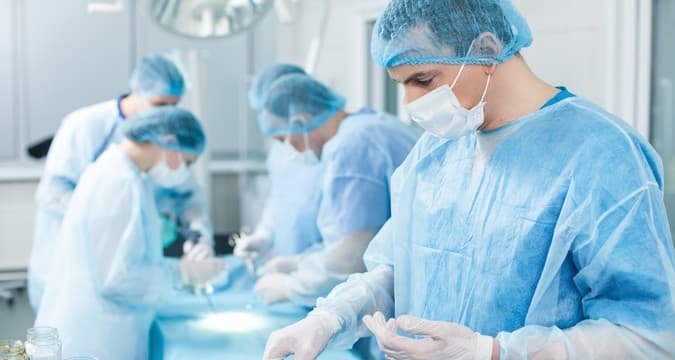Abdominal surgeons specialize in the surgical treatment of diseases of the organs and walls of the abdominal cavity and retroperitoneal space. Specialists at the GMS Hospital surgery center have a thorough knowledge of modern surgical methods and techniques. Thanks to the use of low-impact technologies, most operations are performed without the need for extended hospital stays.
Abdominal surgeons treat a wide array of diseases and disorders of the abdominal organs, arising from many different causes:

Medical care at the GMS Hospital surgical center means experienced specialists, gentle treatment methods and technologies, safe and modern anesthesia, and quick rehabilitation without the risk of complications.
Disorders of the digestive tract and retroperitoneal organs almost always have telltale symptoms. You should seek the advice of an abdominal surgeon if the following clinical signs appear:
Immediately consult a doctor if you experience similar symptoms:
We perform both elective and emergency surgical interventions. Emergency surgery can be performed at any time of the day or night, within an hour after a comprehensive diagnosis at our surgical center.
The use of modern equipment and minimally invasive techniques make it possible to perform operations with minimal trauma and the best clinical results. Sign up for a consultation with a GMS Hospital abdominal surgeon by phone or online.
An abdominal consultation begins with questions about the patient’s medical history. The doctor will inquire about symptoms, ask a number of clarifying questions, and perform an examination to assess the patient’s general condition and the severity and prevalence of clinical symptoms. To obtain a complete picture of the disease, various tests may be prescribed:

The specific diagnostic tests required for a given clinical case are chosen by the surgeon, based on the results of the examination.
The GMS Surgery Center performs a full range of operations to treat diseases and pathological conditions of the digestive organs and the retroperitoneal area:
By using the latest endoscopes and low-impact techniques, our physicians can significantly reduce the duration and invasiveness of treatment and significantly speed up the recovery.
If surgical treatment is required, the abdominal surgeon does not need to transfer the patient to another specialist. The treatment approach is selected by the doctor based on the test results and the comprehensive examination. Indications for emergency hospitalization and emergency surgical intervention are:
For elective (planned) surgery, the doctor first carries out all necessary pre-operative measures, and provides the patient with medical support in the postoperative period. The patient is admitted either on the day of the surgery or the day before (depending on the individual case). In most cases, hospitalization lasts no more than 1-3 days.
The abdominal surgeon will design a rehabilitation plan that will reduce recovery time to a minimum. Sign up at any time for a consultation with an abdominal surgeon at GMS Hospital, by phone or online.
Our specialists will contact you